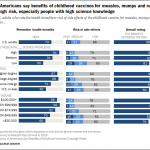survey
It looks as though the check has finally cleared.
You might be wondering what I'm referring to. A little more than a week ago, I took note of how a truly awful survey masquerading as a "study" had risen from the dead once again as two publications in a notorious bottom-feeding predatory "open access" journal after having been retracted after publication in a somewhat less notorious but similarly bottom-feeding predatory "open access" journal. Whether or not these studies were actually retracted the second time around is somewhat unclear. What is known is that they were on the Open Access Text…
Some posts I really enjoy doing. I'm so fired up by the topic that the words flow, and I finish a post in record time. Other posts are more of a chore, written not so much because I'm excited by the topic, but because I feel duty bound to address it. I feel the need to write such posts when, for example, a bit of pseudoscience has gained traction in mainstream groups and readers keep writing me about it, to the point where I finally give in. This is one of the latter posts. None of this is to say that I don't still do my best with these posts to explain and argue my points. Fear not, I'll get…
There are a thousand crappy studies out there carried out with the explicit (although often unspoken) goal of demonizing vaccines by "proving" that they cause autism. Indeed, over the last 12+ years that I've been blogging here, I've deconstructed more such studies than I can remember—or would care to remember if I could. Unfortunately, if there's one thing I've learned about some of these studies, it's that they're like the killers in 1980s slasher flicks. You remember them? Killing machines like Jason Voorhees or Michael Myers, who mowed through teens misbehaving (often by having sex) for…
Being as involved as I have been refuting antivaccine pseudoscience as I've been over the last 12 years, I frequently forget that antivaccine views are not the mainstream. It's an easy thing to do. If you were to immerse yourself in the antivaccine echo chamber as much as I do, you too would start to think that enormous swaths of the country, if not an outright majority, think that vaccines cause autism, sudden infant death syndrome, asthma, a wide variety of neurological disorders, and basically every autoimmune disease under the sun. I know that that's not true, but often it doesn't feel…
As hard as it might be to believe, almost as long as there have been vaccinations, there has been an antivaccine movement, and as long as there has been an antivaccine movement, there have been parents who refuse to vaccinate. Indeed, in the 1800s, there were even groups with names like the Anti-Vaccination Society of America and the National Anti-Vaccination League. These days, antivaccine groups tend to hide their true nature with names like the National Vaccine Information Center and Generation Rescue, but the opposition to vaccinations is the same, just with different evils attributed to…
One of the best things about blogging is that I don't feel obligated to cover a topic completely in one post because I know I can always write another one or revisit the topic later. It also allows me to look at what I like to call "variations on a theme" of various kinds of quackery (or anything else, for that matter). View this as a post looking at one such variation on a theme.
The theme this time is the tendency of antivaccine activists to demonstrate their utter cluelessness when it comes to designing clinical studies. This cluelessness virtually always manifests itself in the frequent…
It is an article of faith among the antivaccine movement that vaccines are degrading the health of our children, such that vaccines cause autism, asthma, diabetes, and a number of other chronic diseases. You won't have to look far on most antivaccine websites to find claims that today's children are the sickest in history and insinuations, if not outright statements, that vaccines are at least part ofthe cause. If you've been following the antivaccine movement as long as I have (more than a decade) or even if you've only been following it one tenth as long, you are probably aware that one of…
Last week was National Women’s Health Week, and the Kaiser Family Foundation used the occasion to release the report Women and Health Care in the Early Years of the ACA: Key Findings from the 2013 Kaiser Women’s Health Survey, by Alina Salganicoff, Usha Ranji, Adara Beamesderfer, and Nisha Kurani. The telephone survey of 3,015 women ages 15 – 64 was conducted before the launch of the health-insurance exchanges and several states’ Medicaid expansions, but after several other key provisions of the Affordable Care Act took effect. Starting with plan years beginning after September 22, 2010,…
That time of the year. Please take the Gene Expression Survey. I'll put up the analysis and the csv file next week. I have the usual questions, but also added a few more that might seem a bit weird. There are 30 questions total, and you don't need to answer all of them, but as I said the more you answer the more data there'll be. I did a trial run and it took less than 5 minutes; most people can answer a question about their sex or religious identity pretty quickly.
Update: You can view the results of the survey here.
While I'm working on my course design stuff, please help some of my lovely bloggy friends conduct some research on how women geoscientists use blogs.
Over the past several years, the geoscience blogosphere has blossomed so much that this fall, the Geological Society of America (GSA) will be convening a Pardee Keynote Symposium called "Google Earth to Geoblogs: Digital Innovations in the Geosciences." Kim Hannula started wondering how blogs serve women geoscientists. Kim recruited the rest of us and we decided to approach this problem as scientists - by collecting data and analyzing the…
Can you spare 50 minutes to help out a graduate student desperate for research participants? If so, please read below:
Dear all,
Within the context of my PhD project at Philips Research and Eindhoven University of Technology, I am developing a questionnaire that will help me to look at the relation between multimedia and feelings about the content. I would like to invite you to help me in validating this questionnaire.
The goal of this questionnaire is to gain further insight in the relation between multimedia and feelings, mostly with regard to how your feelings about the shown multimedia is…
Pew has a new survey out, Public Praises Science; Scientists Fault Public, Media. Lots of interesting facts, though most are not too surprising. Scientists accept evolution at a far greater rate, are less religious and more liberal, than the general public. This is all known. But the report is worth reading, there's a lot of data. One point which might surprise some, young scientists are much more God-believing than older ones. I think one explanation for this might be that older scientists are selection biased.We know that NAS members are far more godless than the general scientariat, so I…
One of the arguments of some younger social conservatives (e.g., Ross Douthat) is that while the abortion wars are in stasis, the Right is losing ground when it comes to opposition to gay marriage. Is this true? Below are charts from the GSS with each column representing a year, from the mid-1970s to the 2000s (not necessarily every year, but every few years).
Looks like Ross is right.
One of the major problems in most societies, subject to "great sorts" of various kinds, is the fact that people observe correlations of attitudes & beliefs, and infer from those necessary relations. For example, if one of the first things that someone finds out about me is that I am an atheist, there is a general presupposition that I am a Left-Liberal. It is true that there is a robust relationship between atheism and liberalism in the United States, the problem I have, as an admittedly illiberal atheist, are those who believe that atheism entails liberalism. In a specific instance I…
Update: Readers pointed out that these results are from the cumulative data set from 1972-2002. So the % who favored laws against interracial marriage were ~40% in 1972, and ~10% in 2002, averaging out to ~25% across the years. The relative differences though seem to remain the same across categories. The nature of party identification in the 1970s also likely explains the peculiar results there.End Update
The GSS has a question of the form:
Do you think there should be laws against marriages between (Negroes/Blacks/African-Americans) and whites?
The sample sizes are huge for this question,…
Gallup has a new report up, This Easter, Smaller Percentage of Americans Are Christian, which is rather self-explanatory. These data aren't surprising, other surveys report the same general finding. Here's an interesting chart with some long term trends:
I want to point to the numbers for Catholicism. In the early 1990s I remember reading popular press accounts about how Catholicism would become the dominant religion of the United States in the early decades of the 20th century because of immigration. That doesn't seem like it's panning out. Why? The American Religious Identification…
The Center For American Progress has a new report out profiling the ideological disposition of the American populace. It simply repeats the old finding that the United States prefers Left-liberal policies a la carte to a far greater extent than the label liberal. This is natural, the electorate tends to favor lower taxes and greater spending simultaneously. I can't but notice the similarity with atheism here; many more Americans adhere to the atheist position than are willing to call themselves atheists. But in the younger cohorts this disjunction seems less noticeable, so I wonder if much…
Despiting having no supporting data, Lott claimed over and over and over again that merely brandishing a gun was sufficient to scare off a criminal 98% of the time. In 2002, he conducted a survey that he claims gave a very similar number -- 95%. But nobody can replicate this result. And by "replicate" I mean using exactly his data and the methods he said he used. You can read about my attempt to replicate here and also download a spreadsheet with my calculations. (You have to get the data from Lott because he doesn't allow redistribution of his data.)
And I'm not the only one. Ina peer…
SW Notes: This post was begun a few weeks ago...you know, in the break between semesters. But I've been delayed and delayed in getting it done, and today is a day of metaphorical desk-clearing. So I'm just going to put it up now, half complete and let you all finish discussing it in the comments section.
The scene: My car insurance office
Insurance agent: You work at Mystery U.? You're on break now for a couple weeks, right?
ScienceWoman: Well, sort of. Classes start back up in mid-January, but there's lots of work to be done before then.
Insurance agent: Oh.
That scene is hardly unique in…
Eos has just published the results of a survey of 3146 Earth Scientists conducted by Peter Doran and Maggie Kendall Zimmerman. The graph below shows the results for this question:
Do you think human activity is a significant contributing factor in changing mean global temperatures?
The 97% of active climatologists is 75 out of the 77 in the survey. Doran and Zimmermann say:
While respondents' names are kept private, the authors noted that the
survey included participants with well-documented dissenting opinions
on global warming theory.
I'm guessing that Lindzen and Spencer are the two…


